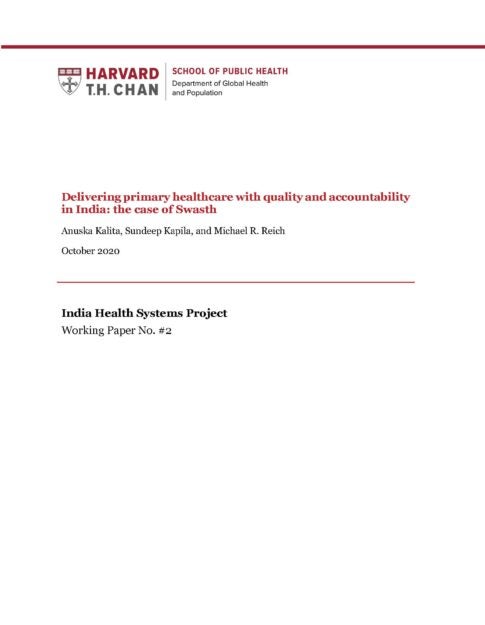Delivering primary healthcare with quality and accountability in India: the case of Swasth
By Anuska Kalita, Sundeep Kapila, and Michael R. Reich
October 2020
Abstract
Mumbai’s health system faces several challenges, as in many other parts of India, and both the public and private sectors have failed to deliver a broad set of good quality primary healthcare services in a patient-friendly way. Swasth, a not-for-profit social enterprise, was founded in 2009 with an aim to address many of these gaps by delivering primary healthcare services to low-income populations in Mumbai through a network of health centers.
Using both primary and secondary data, this paper presents the interventions that Swasth has undertaken to address key health system challenges in Mumbai: (1) providing a broad set of primary healthcare services, including preventive-promotive and curative care, as well as dental care, diagnostics, and drugs; (2) delivering easily accessible and patient-friendly care, through conveniently located and timed clinics; (3) assuring accountability to patients for services, by issuing warranties for timely and lowest-priced services, and for treatment outcomes in dental care and hypertension management; and (4) promoting provider behavior that prioritizes quality and accountability, through incentives, technology systems, and careful recruitment, training and monitoring of their staff.
We conclude the paper with a discussion on the challenges of financial sustainability and scalability that Swasth confronts today. We also present an examination of potential lessons for Health and Wellness Centers under India’s Ayushman Bharat program, specifically, lessons for expansion of primary healthcare services, for making public sector facilities more accessible to people, for introducing measures of accountability to patients, and for designing mechanisms to ensure quality of care by public sector providers.
This paper is intended to inform PHC interventions in both public and private sectors and is envisioned to be useful for readers involved in designing PHC reforms at the central and decentralized government levels.
Resources
Download this Working Paper here.
